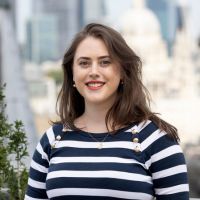7 min read
We sat down with Neila, who took IR105: Understanding Foreign Policy: the Diplomacy of War, Profit and Justice in 2024, to hear about her thoughts on the course, and how it's helped her in her future plans.
Why did you decide to attend LSE Summer School?
I wanted to explore more perspectives of international relations from other parts of the world and at other universities. LSE offered the perfect mix of deepening my knowledge and meeting people from all over the world. I could also gain credits towards my graduate degree at LSE Summer School, which was a bonus.
Why did you choose your course?
It was hard to choose between all the interesting courses LSE Summer School has to offer! Ultimately, the IR105 course programme felt the most relevant to me, and would help me to gain the greatest information within my field of expertise, and deepen my knowledge of the different approaches to international relations, particularly during wars – this was an area of interest for me.
Tell us about an average day as a student on your course.
My day would typically start with a 10:00 lecture, which lasted three hours and was always very interesting and engaging. After that, I would grab some lunch with fellow students somewhere nearby. Then it was time for the seminar, where we would discuss the lecture materials and pre-assigned reading. Usually, we would also do an exercise that related to what we had learned that day. After this, I would have dinner with my Summer School friends, maybe revise some of the course materials and enjoy the amazing night life London has to offer.
What was your favourite part of your course?
Unexpectedly, I really enjoyed the intensity of the course. It was as though a three month course was squeezed into three weeks, which made me work harder but also more efficiently and rigorously. Obviously, it was also great to meet so many people from different backgrounds and hear their perspectives.
What advice would you give to students considering your course?
If you would like to delve into foreign policy analysis and understand how it was, is, or can be used by different entities, then this course is definitely for you!
What are your short-term professional goals, and how does your course contribute to these goals?
Currently, I am working at the Dutch House of Representatives, where I am already applying the knowledge I gained from this course. I would love to work for an international organisation in the future, so this course on foreign policy analysis will definitely come in handy!
Was meeting and talking to other students on your course easy?
On my course there was a wide variety of students from different backgrounds. This was very enriching, not only to learn more about their culture and languages but also to hear their perspectives on certain things related to foreign policy. Everyone was from a different part of the world and very open to meeting new people so I would say it was definitely easy to meet and talk to other students. Students were quite vocal in class and there were some group assignments we had to do, so that was the perfect opportunity to get to know fellow students a little better.
What would be your top tip for future Summer School students?
My top tip would be to not be afraid and get out there! It sounds a bit cliché but it really is important to be open to new people, information and possibilities - the sky’s the limit. It is important to remember that everyone is in the same boat, trying to get through the lectures, meet new people and explore what London and LSE have to offer. There are so many opportunities to meet people and learn something new so I would definitely recommend picking some activities that you like. That is the best way to make the most out of your LSE Summer School experience. Next to the fun social activities, don’t forget about the Spark events! By attending these, you can gain a digital badge that you can display on LinkedIn, to show off the professional skills that you have gained at LSE.
Did you feel supported by your lecturers?
The lecturers were very keen to help and discuss anything with students. There were no stupid questions or answers and we were constantly invited to participate in class discussions and give our own views on certain topics or occurrences that were discussed. Even after the lectures or seminars ended, the lecturers were very welcoming and accommodating. I had some personal topics I wanted to explore and discuss and the lecturers were happy to help me and provide guidance. It was nice to be taught by such motivated, intelligent, and inspiring people.
How will the course contribute to your longer-term goals?
This course was really detailed. We studied many real life examples to illustrate the foreign policy analysis and that helped me to better understand several past and present (major) world events. I would love to work at an international organisation in the future and having experienced the LSE lectures and teaching styles, I believe I am fully equipped to contribute to a better world. Aside from the course, there were so many career enhancing activities like the Spark events, where we had the opportunity to gain useful skills for future endeavours. I feel ready for my future and LSE contributed greatly to this!
This interview was written by one of our 2024 Student Ambassadors, who are here to share their stories and help you understand the summer school experience at LSE.

